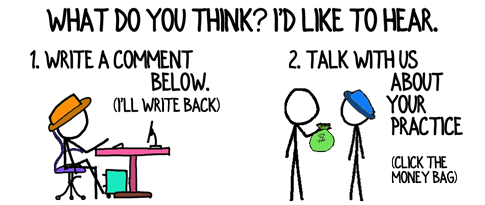How do you consistently tip the scales in your favor when your prospect is considering a number of consulting firms? Beyond the obvious—experience and expertise—there are a number of tactical, actionable drivers of choice. Below I highlight seven factors that will elevate you above any competition.
- Responsiveness. The first consultant to reply when a prospect is looking for help, the quickest consultant to respond in general, and the most attentive consultant has a huge edge over the competition. You cannot overestimate the impact this factor has on prospects. A more responsive consultant will often get the nod over a more experienced competitor.
I respond quickly. At least half the time clients and prospects call they reach me immediately. If I can’t pick up the phone at that moment they receive a call back within a few minutes. Two hours is my guaranteed turnaround time. Context Documents and proposals are turned around in one day, not two weeks.
Action Prompt: What policies and processes can you put in place that will increase your responsiveness? - Demonstrate the Trust Triangle. In a prospect’s mind, you’re trustworthy if you’re thinking about his best interests, you’re not going to harm him and you’re going to help him.
 I demonstrate my regard for the prospect’s best interest by openly raising his misgivings (see this post) and by frequently making suggestions that could reduce the scope of a project. I minimize the fear of harm by asking about risks and concerns during the Context Discussion.Action Prompt: Are you bringing up issues, risks and concerns during the discovery process? Are you overtly making suggestions that benefit the prospect rather than you?
I demonstrate my regard for the prospect’s best interest by openly raising his misgivings (see this post) and by frequently making suggestions that could reduce the scope of a project. I minimize the fear of harm by asking about risks and concerns during the Context Discussion.Action Prompt: Are you bringing up issues, risks and concerns during the discovery process? Are you overtly making suggestions that benefit the prospect rather than you? - Relatability. Consulting is a human endeavor and clients will choose the consultant with whom they experience the best rapport over a consultant that is objectively more qualified. If you easily remember names and details about others and are naturally charismatic, you have a big head start. The rest of us have to work harder.
Three steps I’ve taken: Made a conscious choice to be interested in people; Practiced attending to the person I’m conversing with (rather than multi-tasking); Thrust my quant-geek predilections into the background so emotional aspects of a conversation take precedence.
Action Prompt: What are you doing to improve your relatability to others? In particular, what kind of person rubs you the wrong way and what can you do to maintain your relatability when you run into that personality type? - Direction vs. Precision. Prospects are generally seeking a solution to their problem, not the solution. Further, in most cases the roughly right answer today is better than the precisely right answer next month. Consultants who are detail oriented, in love with their own processes or passionately absorbed in their area of expertise often forget that the extra decimal place and the dotted-i don’t make any difference in the client’s real world.
I promise rapid transportation to Tahiti rather than more complicated, rigorous, drawn out routes to Nirvana. And I constantly ask, “Will delving even deeper on this solution make a meaningful impact on the client’s results?”
Action Prompt: What can you do to offer faster, good-enough results rather than textbook-perfect, unduly detailed answers? - Good vs. Different. Similar to the factor above, prospects want a solution that works, not a solution that’s different. Too many consultants are focused on their point of difference and what makes them unique.
When I suggest to a corporate prospect that they use a certain consultant, I highlight the consultants’ track record delivering the desired outcome, not the features, attributes, or processes that make them different.
Action Prompt: Are you overly focused on your point of difference? What can you do to cast a brighter light on how good you are? - Clear Message. Whether it’s your value proposition, your proposal or your final deliverable, lucidity counts. The consultant whose communication is concise, and easily understood will win the gig. Abstruse, jargon-laden marketing materials and proposals make the prospect work too hard. Rather than making you look smarter, they just leave the impression you’ll be painful to have on the team.
One of the best lessons I learned during my early consulting years was to always know my story. In other words, what handful of words will communicate the point I’m ultimately trying to make? I always know my story before I talk with a prospect.
Action Prompt: What is your story? What can you do to boil your value proposition down to a handful of words? For every document you write, can you communicate the ultimate message in one or two short sentences? - Confidence & Passion. In the comments on one of my recent posts, a savvy consultant remarked that clients are unlikely to trust (and choose) a consultant who seems nervous or unsure of their offering. Obvious, but true. Let’s say a prospect is faced with two consultants: one says, “I’m comfortable I can deliver your outcome.” The other gushes, “I can totally do this. I love these types of projects.” It’s obvious who will be chosen.
I have organized the work I do for corporations and consultants around my passions. As a result, every conversation with a prospect is an exciting opportunity. My team also tracks our testimonials and has organized concrete examples of our good work into a compendium. With that grounding, it’s easy to communicate unwavering belief in my offering with sincerity, not braggadocio.
Action Prompt: What can you do to bolster your confidence and spark your passion? If your confidence flags on occasion, you may enjoy this post:


I constantly get emails from consultants saying they learn from other readers’ comments on my blog. Therefore, please post your thoughts below. What action will YOU take to improve your performance on one of these factors?
Text and images are © 2024 David A. Fields, all rights reserved.

 David A. Fields Consulting Group
David A. Fields Consulting Group 

Great ideas, David. All should be followed for the independent consultant to be successful.
In line with some of these, I realized early on that although I may be interested in having a pool of clients to grow my practice, for my clients, their business was first and foremost to them. When engaging, I made it a point to take ownership by using “we” instead of “you” and by getting involved with them from the moment I met them, vs. when the engagement started. This didn’t include much “free” work being given out but might include introductions, invitations to business events they might benefit from, or inclusion in articles, podcasts, or panels I might be running.
Fred, you are SO right about clients’ business being about them. You’ve given a great example of “right side up thinking.” Your practice of using “We” language is terrific and I’m sure it yields dividends for your practice. Thanks for your comment.
David
These are critical lessons. The sooner Consultants/ Professional learn them the clearer the path to success becomes. From my early days I have been consumed with trying to establish a “unique” proposition vs simply building on the reason my Clients want to work with me. I always though of myself as a good listener but you have made it clear that the secret is listening more aggressively than I ever have.
Charles, you’re combining two important points: clients are looking for good, not different; and, listening is a core skill for a consultant to be successful. I have little doubt you’re already a good listener! Thank you for adding your thoughts to the conversation.
I love when I read one of your posts and it is directly related to client work I am doing right now. It’s a brand repositioning project (for a consulting company!) and a major area of their new positioning (as I’m recommending it) is clarity and concision of language around their offering, process, etc. So many companies in their space sound alike, locked in an arms race of jargon-laden processes and services. There seems to be nothing these companies don’t do, even as they make it impossible to understand what they actually do do (based on their website messaging).
Anyway, affirming to read your post and reference some great insights. Thank you.
You’re welcome, Sean. The advice you’re giving your clients is excellent. My friend Marshall Goldsmith, who is unquestionably at the top of the coaching game, always makes it clear what he doesn’t do. Pick a problem and become absolutely fabulous at solving it; that will always attract more business than saying you do everything for anyone. Thank you for posting.
I’m amazed by how many consultants (and clients) struggle to be responsive. I also have won projects simply because others won’t return phone calls. I think many people fear that being responsive will mean taking calls at their child’s recital, or at dinner with their significant other. Don’t let our capacity for availability to be a curse – if it’s not a good time, simply acknowledge the caller, and ask for a better time to follow up, or during a break, simply return the voicemail (or email) within a reasonable time. They will appreciate you for it.
Boy, ain’t that the truth, Ryan! You also make an important point: being responsive doesn’t mean you have to be on call 24/7 and it doesn’t mean you have to solve the client’s problem immediately. Quickly letting them know you heard their call for help earns bushels of brownie points.
Thanks for joining the conversation.